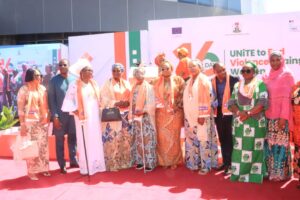The Minister of Women Affairs, Hajiya Imaan Sulaiman-Ibrahim, has stressed the need for deliberate action to protect the rights, safety and dignity of women and girls across the country.
She made the call at the launch of the annual 16 Days of Activism Against Gender-Based Violence (GBV) in Abuja on Monday with the theme “Unite Campaign: Towards Beijing to Prevent Violence Against Women and Girls.”
The minister, who described GBV as a societal issue and an impediment to development, expressed concern over the statistics in the country.
She said the statistics show women and girls at great isk, stressing that “the growing trend represents gross violation of human rights and undermines the very fabric of the society, thereby preventing women and girls from achieving their full potential.
“Gender-based violence is not just a women’s issue; it is a societal issue, a human rights issue, and an impediment to our nation’s development.
“The statistics before us on GBV in Nigeria remains deeply troubling. Even as we embark on this campaign today, a little child has just violated, a woman has just been abused, a young girl’s life is at risk somewhere in a community, all for no just cause.
“Current reports indicate that 30 per cent of Nigerian women and girls aged between 15 and 49 years have experienced physical or sexual violence at some point in their lives.
“This violence occurs not only in homes, but extends to schools, workplaces and communities. Violence does not know any tribe nor creed, it cuts across social and economic boundaries. It affects both young and old.”
Sulaiman-Ibrahim, therefore, urged the media to amplify the voices of survivors, highlight success stories and hold perpetrators accountable, as well as educate the public against such act.
She said the campaign would focus on community mobilisation and education to challenge harmful cultural norms, stereotypes and practices that perpetuate violence.
“We will continuously engage traditional and religious leaders as community gate keepers,” she added.
Ms Beatrice Eyong, the Country Representative of UN Women to Nigeria and ECOWAS, also stressed the need for renewed efforts toward addressing gender inequality and violence against women and girls.
Eyong said 42 per cent of women were financially excluded, with women holding less than five per cent of elective positions.
According to her, this imposes significant economic loss, estimated at 1.5 per cent of Nigeria’s GDP annually, hindering development and progress.
She added that “GBV is everywhere, it is not good for neither the men nor the women. It has the capacity to reduce economic growth if this is not reduced, we will never come out of poverty. It is not just a human right issue, it is an economic issue.
“The funding for gender equality and women empowerment has reduced, and as experts, we have to think of innovative ways to mobilise funds to fight the menace.”
Gautier Mignot, European Union Ambassador, said “we cannot help but commend the critical reforms that have been initiated by state government and civil society organisations, of which, we have started seeing progress.”
Represented by Toyosi Giwa, Technical Lead, Rule of Law and Anti-Corruption ( ROLaC), Mignot pledged sustained advocacy “until perpetrators are held accountable and punished and every survivor gain access to assistance that they need to recover and heal.”
Mr Gabriel Aduda, the ministry’s Permanent Secretary, said that in commemorating the 2024 activities, commitments would be re-enforced, while collaborations and empowerment of survivors strengthened.
Aduda added that “GBV remains a pervasive issue in our societies, transcending borders, cultures and socioeconomic status. It continues to rob individuals of their dignity, undermine families and hinder national development.
“In Nigeria, statistics paint a sobering picture, with a significant percentage of women and girls experiencing violence in their lifetimes. This is unacceptable, and we must act with urgency,” he said.
Aduda, therefore, stressed the need to move beyond rhetoric by amplifying voices, strengthen actions and deepen resolve to address the root causes of GBV.
“Every law we enact, every programme we implement, and every survivor we empower brings us closer to a Nigeria where women and girls can live free from fear and violence,” he said. (NAN)























